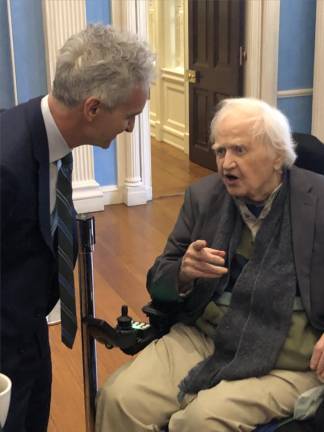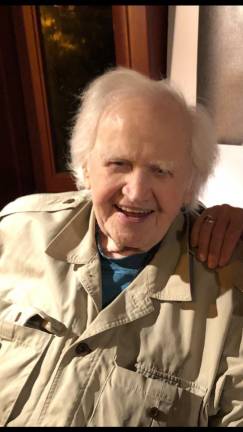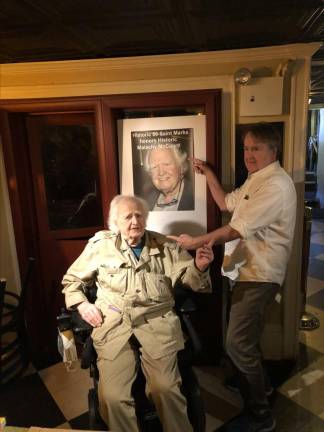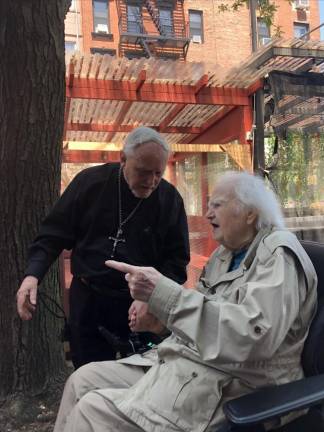Malachy McCourt: Made It to Another St. Patrick’s Day! And Expounds on the Patron Saint Who Really Isn’t a Saint
Now we are happy to exclusively report: McCourt made it! On St. Patrick’s Day, he met both Mayor Eric Adams at breakfast at Gracie Mansion and Cardinal Timothy Dolan outside St. Patrick’s Cathedral as McCourt rolled up Fifth Ave in his wheelchair marching with the LBGTQ contingent. And we’re delighted to have him writing for our pages once again and telling us all you never knew about St. Patrick, the patron saint of Ireland and New York who McCourt tells you is not really a certified saint.
Editors Note: He was, almost from the moment he returned to America from Limerick where he was raised, a man about town. In his early days, with flaming red hair and rugged good looks, he was an actor on soaps including Ryan’s Hope and One Life to Live. His movie credits range from the award winning 1990 The Field, The Brinks Job, the Molly Maguires. He once played a Catholic priest in the HBO series Oz, although if you ask him his religion today he may reply, “I’m an atheist, thank God!”
I’d venture the vast majority of revelers know nothing of the man who they are, in theory, celebrating on St. Patrick’s Day. According to the rules of the one Holy Roman Catholic and apostolic church, a saint is one who has performed two authentic miracles. But there’s no record of any miracles for Patrick. While St. Patrick is said to have chased the snakes out of Ireland, this is myth. There were never any snakes in Ireland to chase in the fist place.
Most probably don’t realize the patron saint of Ireland is not Irish, and Patrick is not his name. This Patrick chap was originally named Maewin Succot, possibly a native of Wales who was abducted as a teenager by an Irish buccaneer named Niall of the Nine Hostages and brought to Ireland and sold as a slave to a landowner named Milchu in county Antrim. Maewin Succot spent six years tending sheep before he said he had a vision to go to the sea where he met a ship that took him back back home. After escaping Ireland in his early 20s, he got to France, hooked up with his uncle, a priest named Martin of Tours. Maewin’s father and grandfather were also priests. [Celibacy did not come into vogue for priests until the church was 1,000 years old and it was not formalized into official church dogma until the Council of Trent in the 16th century]. Although wealthy, they were exempt from taxes in those Roman times because they were men of the cloth. At baptism, Maewin took the name Patricus from the Latin meaning “father.” Then it was off to Rome with him, where a pope named Celestine proclaimed him a bishop. The newly named Patricus, or Patrick, expressed a wish to return to Ireland with a mission to convert the pagan Irish to Catholicism.
Paganism was no bar to hospitality so he found a somewhat grudging welcome. Maewin aka Patrick had explained the holy trinity--supposedly three persons in one God–by using the shamrock, three leaves and one stem. Catholicism swept the island of Ireland as if it were a contagious condition. Patrick died on the 17th of March and eventually the day was renamed St. Patrick’s Day and observed by celebrating mass on a day that was designated a holy day of obligation. Ireland only in recent decades has embraced the day as a secular holiday with parades and pub crawls, mainly to keep the American tourists happy. Initially, as a holy day of obligations, the pubs in Ireland well into the 20th century were shut tight on St. Patrick’s Day. And the parades, while festive can’t compare to New York’s to this day. Back to the early fifth century, and it appeared to the naked eye that Ireland was now a bastion of Catholicism. But sometime after Patrick’s death, rumor reached the ears of Henry II in England that the Irish were defecting from the Holy Roman Church and were back practicing worshipping their old time gods. This was before the Protestant reformation so all Christians were also basically Catholics. The alarm about the once again pagan Irish was communicated all the way to Pope Adrian in the Vatican. Pope Adrian was the only Englishman ever to sit on the papal throne and was very annoyed that the Irish were returning to paganism.
With the Brits, all is never all set and done. It’s time for things to be undone. So, Henry II although warned by the Queen mother to let the Irish be, took heed of the English pope who said: “Go get them and restore the power of the church.” That triggered the first big invasion, but really did not get much beyond Dublin. Subsequently, a king named Henry VIII said I do and did for every woman in sight got a decoration from the pope designating him as “Defender of the faith.” Though Henry VIII split with Rome, the saying is still on British currency for some odd reason. Now, holy mother church rules that no matter the dissatisfaction in a marriage, you better get used to it and forget divorce. So, it was with Henry VIII that decided that such papal edicts did not apply to him since he felt he ruled by the right of Divine Providence. As such, maybe he outranked the Pope. So to facilitate one more divorce, he formed the Church of England with himself, Henry VIII as its spiritual head.
The Irish were content taking holy orders from Rome and did not accept that there was a new church and a new boss in London. Regardless of humanity, both bosses, one in England, one in Rome, held the Irish in contempt, terming us lazy, barbaric, uncivilized, violent, drink sodden in need of the firm hand of Mother England to keep us civilized. Now it had the added drama of religion, since the Church of England was now the official church of the country that wanted to lord over the Irish, which stayed Catholic. But the stark differences between the two countries were there for over a thousand years, so the new religious split only added to the antagonisms.
Part of Ireland, in the northeastern six counties is still British occupied. Despite rebellion, revolution, uprisings, insurrection, mass executions, the Brits refused to fully relinquish their stake. Most of the rebellions were betrayed by Irish men, leading James Joyce to once proclaim: “In the spirit of Irish fun, they betrayed their principles one by one.” George Bernard Shaw wrote “Ireland is like no other place on earth. No man on earth has touched its sod or breath’d its air without being change for the better or the worst. It produces two kinds of men, strange perfusion, saints and traitors.” Due to the influence of the Catholic Church, a majority of the Irish old guard tend toward the disease of conservatism which is the reason many Irish opposed the moves towards independence in 1916 at the start of the War of Independence. When one wonders at the success of the tyrannical anti-democratic Trumpism all you have to do is look at the assembly of Irish supporting that danger to the USA. Some of the names Flynn, Bannon, Kerry, McCarthy, Kennedy (not the real one, the new fake one with the same name) Hannity, Conway, O’ Reilly, Murphy, King, Mulvaney, Twomey, Ryan are more minor citizens who are flattered by the attention of their intellectual inferiors. Traditionally, for centuries, many Irish preened with pride at getting a pat on the head from an inferior such as a titled Englishman. Ireland is a small island on the edge of the Atlantic, about 320 miles long and 135 miles wide, inhabited about 5 million natives and by about 1 and a half million who are still British subjects in the north. Starting with the Vikings, it was invaded nine times. In contrast, the only place the Irish invaded was New York, and at times it was a non-violent invasion. There is an old Irish adage: “a stranger shall flourish and the natives shall perish.” “Hospitality” was not just a word, but a significant of the culture. In the old world superstitions, one must never let a stranger pass your door without offering him the best of what you have because you never know if the stranger could be a deity and later on the name of the possible stranger could be Jesus Christ. The failure of the potato crop in Europe drove about 2 million Irish men and women to these shores. Many of them had jobs as servants to the Fifth Avenue aristocracy. It didn’t matter what names they came with; it was simpler to call all the women “Bridget” and all the men “Paddy.” And if they got a little rowdy on a Saturday night, they’d be carted away by the police in “paddy wagons.” Bridie and Paddy. They spoke a form of English peculiar to them, were amusing, cheeky, witty. There is a story that Paddy had to be restrained from trying to sweep the cobblestones out of the stable yard grounds. And when the madame of the house complained to Bridie about the dust on the furniture, she said “I could write my name in the dust.” Bridie replied, “Isn’t education a grand thing?” As said, every rebellion in Ireland was betrayed by an Irish person, and it extended itself to the United States when an Irishman named Thomas Hickey, a member of George Washington’s staff, was hanged publicly for plotting against George Washington. There is no point in saying you are proud to be Irish because pride is one of the seven deadly sins and your coming into this world was not your doing. “I like being Irish. It’s not a bad nationality. But don’t be getting “big headed” and thinking you’re better than everyone else on St. Patrick’s Day. But also remember: you’re certainly as good as anybody else.
As for me, at 91 years old, I won’t have a drink for the 38th year in a row. I’ll celebrate by being alive in all that that means. Take that, all ye bastards who wished otherwise. I made it to another St. Patrick’s Day!



